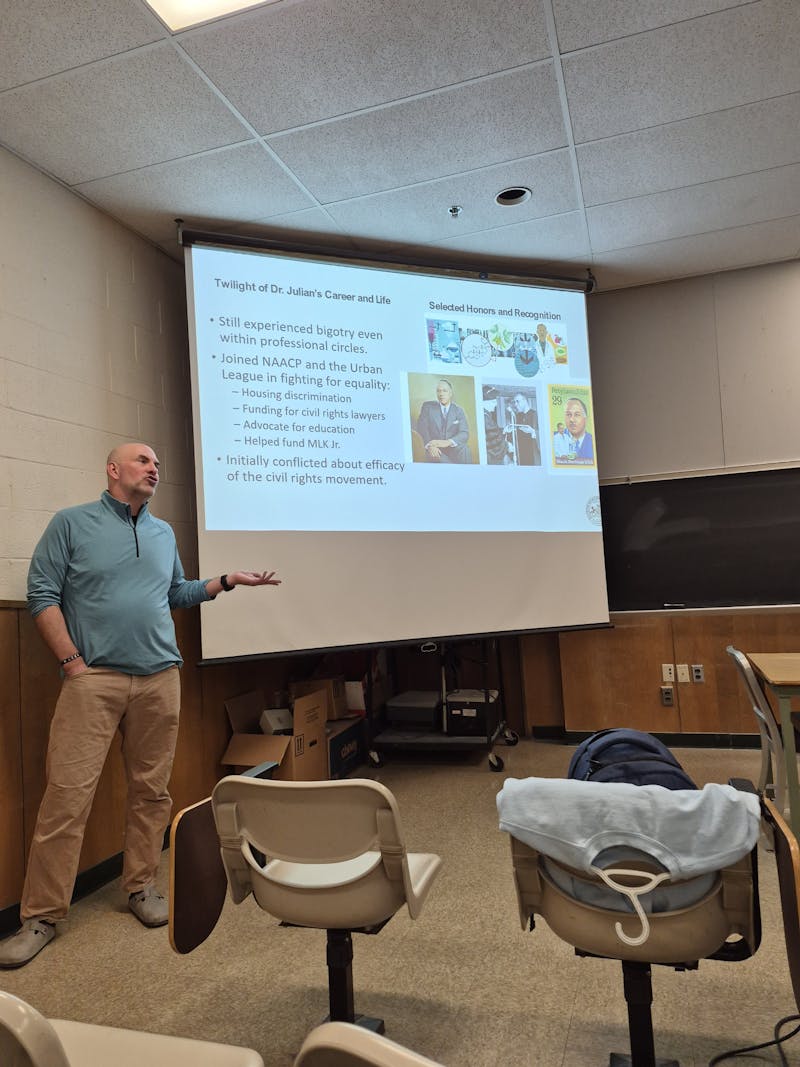The Shippensburg University Sociology and Anthropology Department will undergo a major change following the spring 2026 semester as the only professor of anthropology, Karl Lorenz, will be retiring after a 32-year career at SU.
Following Lorenz’s retirement, the remaining seven courses offered for the anthropology minor will be placed in moratorium until new anthropology professors are hired.
Lorenz reflected on his career at Shippensburg University, the importance of the anthropology program and the impact that will result from the program being suspended.
At SU, anthropology is offered as a minor under the conjoined Sociology and Anthropology Department. Lorenz recalled asking university administration for approval in hiring a fourth full-time anthropology professor in the mid-1990s.
Had they been able to do so, the department would have hired a biological anthropology professor, who along with two cultural anthropology professors and an archaeology professor would have covered three of the four subdisciplines of anthropology.
According to Lorenz, anthropology could not be offered as a major as the university did not approve of hiring a new anthropology professor. Over time, faculty retired, and their positions were not filled by new professors.
“Because the administration has every step of the way not replaced those positions with an anthropologist, our program has gotten smaller and smaller because we can only offer fewer and fewer courses,” he said. “Even though three courses are offered in the gen-ed program.”
Currently, there are seven offered courses in the anthropology program at SU. The three required core courses for anthropology minors are Great Discoveries in Archaeology, Cultural Anthropology and Physical Anthropology. Additionally, the program includes Introduction to Archaeology, Ancient Americans, North American Indians and Aztec and Maya Archaeology.
According to Lorenz, the immediate future of the program is not optimistic, as opportunities to replace positions have been repeatedly rejected.
“There is no future. The future would be to see it taken out of moratorium. The future would be to see full-time anthropology tenure-track professors hired here. The future would be to see anthropology courses offered again,” he said.
For current anthropology minors, Lorenz suggested that they will have to enroll in online anthropology courses through other universities like West Chester or Millersville following his retirement. These courses can then be transferred into Shippensburg as free elective credits.
The impact will not just be felt for anthropology minors. Many other programs at Shippensburg offer anthropology general education credits. The list of programs includes Peace Corps prep, the ethnic studies minor, the international studies major and the sociology major.
“Sadly, it’s about budget and numbers, and the big programs attract more students and fill more classes than the small programs,” Lorenz said, speaking on what programs are prioritized at Shippensburg University. “Small programs wither on the vine because they aren’t supported. If you don’t support us, how can we grow?”
As the anthropology minor program has grown smaller, so has its student body. According to Lorenz, there are about 10 students currently enrolled with an anthropology minor. He recalled that when there were three professors, the program served between 40 and 50 anthropology minors every year.
“Some of those students went on to graduate school to get PhDs in anthropology. We were able to get students into the field, but not anymore,” he said.
Losing the anthropology program removes the opportunity for students of various majors to be exposed to cultural knowledge that is increasingly important as the U.S. population continues to become more diverse, Lorenz explained.
“They could replace [a retired professor] with a younger tenure-track junior professor, where the starting salary is lower, but if you don’t replace them at all, you save all that money,” Lorenz said. “But there’s a consequence, you lose the program. You lose the exposure of anthropology to students. I have to ask the administration, what are your priorities?”
If the university is no longer willing to support the anthropology program, Lorenz argued that interested students would go to other institutions, further worsening the program’s position.
“That’s another problem with retention. This university is concerned about losing students. How is that going to help their cause if students leave because a program they were interested in pursuing is not being supported and ends,” Lorenz said.
A major concern he has with administration is the focus on the class-to-career pipeline and how it deprioritizes some educational fields like anthropology.
Lorenz argued that a background in anthropology is highly beneficial as it can help students navigate an increasingly diverse workplace. During his time at Shippensburg, he has had numerous students go on to lead successful careers in different fields.
“Some went into the Park Service, some went into museums, one went and got her PhD in archaeology and is teaching at IUP,” he said.
Last year, the chair of the Sociology and Anthropology Department requested that Lorenz’s position be filled following his retirement. The university again turned down the request.
Despite the uncertain future of the anthropology program, Lorenz also reflected on the many positive experiences of his 32-year career.
Among the seven courses that he teaches, his personal favorite to teach is Great Discoveries in Archaeology. The course focuses on the major archaeological discoveries of ancient civilizations from around the world. “It really gets students interested in anthropology, but also in the field of archaeology,” he said.
Lorenz recalled the Fulbright research grant that he received for work he did in Egypt in 2009 as one of the highlights of his career. The Shippensburg alumni magazine released a feature on his family’s experience in Egypt, which he remembered fondly.
The Fulbright Research Scholarship is among the many awards that some of his students have gone on to achieve, with a background in anthropology being a significant factor in their success.
“I’ve been on the Fulbright Committee, where we choose from among the students who applied and helped them with their applications,” he said. “Obviously, there’ll be no anthropology representation on that committee anymore.”
In retirement, Lorenz looks forward to the free time he will have. He and his wife plan on retiring to the Cape Cod coast in Massachusetts, which will come with long walks on the beach and exploring the new surroundings.
“I won’t leave anthropology,” Lorenz said. “I will definitely still be engaged in it and doing some research.”





The Slate welcomes thoughtful discussion on all of our stories, but please keep comments civil and on-topic. Read our full guidelines here.